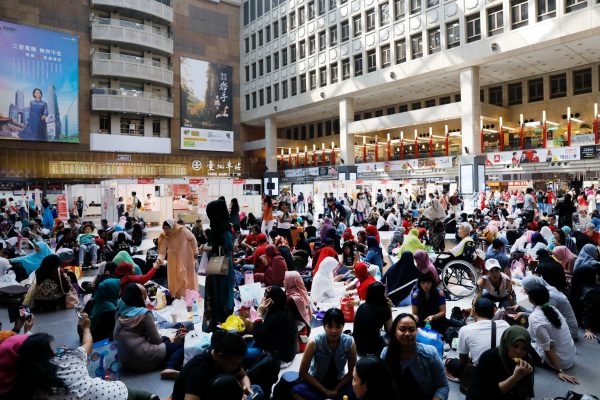The NSP has been one of the Democratic Progressive Party’s (DPP) signature policies since President Tsai Ing-wen took office in May 2016. It is an inter-regional initiative calling for more attention to be given to 18 countries across Southeast Asia and South Asia, as well as Australia and New Zealand.
The NSP, viewing India, Indonesia, Malaysia, the Philippines, Thailand and Vietnam as the prioritised countries, faces obvious political barriers resulting from Taiwan’s restrained ties with countries in the region and sour cross-Strait relations. Consequently, while the Office of Trade Negotiations plays a crucial and probably leading role with individual NSP target countries, the Tsai administration claims to have relinquished the leading position to Taiwan’s business and industrial sectors.
A tentative review of the NSP shows that, in general, the policy has given people in Taiwan a greater awareness of certain Southeast Asian countries. Various Taiwanese government agencies have attempted to divert more resources to the regions specified in the NSP plans. Moreover, more government-funded research in Taiwan has been directed to the investigation of various bilateral or multilateral exchanges.
The NSP has tried, not very effectively revenue-wise, to help Taiwan’s tourism industry combat the declining number of mainland Chinese tourists since the second half of 2016. The DPP government has provided subsidies to the travel sector and developed a ‘visa facilitation’ or ‘visa waiver’ policy for certain Southeast and South Asian countries. The number of Southeast Asian tourists to Taiwan has continued to increase, reaching 1.65 million in 2016.
But while the NSP has somewhat helped the development of tourism and cultural exchanges — two of it’s short- and mid-term goals — the NSP remains less impressive in the other areas, including economics, trade, investment, talent exchange and bilateral or multilateral dialogue.
For instance, the DPP has placed importance on refining and renewing the bilateral investment agreements (BIAs) already signed with the Philippines, Vietnam and Thailand in the 1990s. Seven more BIAs were already struck with Southeast and South Asian countries by the Tsai administration’s predecessors. So far, none of the ten BIAs has been renewed or upgraded. Occasionally there are some high-level exchanges between Taiwan and some NSP target countries, but no ground-breaking moves have been made by either side.
There are several other reasons to take a more pessimistic view of the NSP’s future.
First, the NSP lacks experience in inter-agency coordination. With little bureaucratic change from Ma Ying-jeou’s to Tsai Ing-wen’s presidency, the former’s mediocre performance in inter-agency coordination during the Cross-Strait Economic Cooperation Framework Agreement negotiations is indicative of the difficulties the Tsai administration has faced in promoting the NSP at full steam.
Second, the NSP’s pursuit of connectivity in a wide range of sectors, as well as the upgrade of bilateral and multilateral relationships, seems too broad and ambitious to be successful. With 18 countries on its radar screen, the NSP budget appears insufficient to cover the wide array of policies and issues on the table, pointing to the likely limited perimeter of its implementation in the years to come.
Last, the NSP may face significant opposition, with mainland China exercising growing political and economic influence in Southeast and South Asia via the Asian Infrastructure Investment Bank (AIIB) and the Belt and Road Initiative (BRI). Taiwan’s NSP can benefit, at least economically, from participating in the AIIB and BRI — but only if there is a certain level of mutual trust between Taipei and Beijing. If Taiwan is unwilling to work with mainland China, the next best thing for Taiwan’s increasingly inferior position would be that mainland China not obstruct its NSP objectives where the sensitive sovereign status of the Republic of China or Taiwan remains untouched.
Unfortunately, the international space for Taiwan and its NSP to manoeuvre is being gradually squeezed by mainland China’s endeavour to internationalise the ‘one China’ policy. Mainland China has recently forced Vietnam and Singapore to publicly commit to the ‘one China’ policy. In addition, mainland China has already tried to limit Taiwan’s desire for further economic ties and upgraded relations in the region. Both are preventive measures to weaken Taiwan’s international presence and the DPP’s performance in government.
It is very likely that aggravated cross-Strait relations will be inimical to the success of the NSP. Tsai was adamant in early 2016 that Taiwan’s diplomacy ‘would rely on its own power, not China’s goodwill’. If Tsai keeps this stance when it comes to Taiwan’s foreign and cross-Strait relations, the prospect of the NSP’s success will become even smaller.
The DPP government has chosen the tougher road in implementing the NSP. It has withdrawn from the bedrock of the past cross-Strait dialogue — the vaguely defined ‘1992 consensus’. This has prompted Beijing to assertively block Taiwan’s moves for a more friendly environment. Without a doubt, the NSP faces a long, uphill battle that lacks sufficient funding, efficient inter-agency coordination, substantial support from the parties concerned, and accommodating cross-Strait relations.
Kwei-Bo Huang is Vice Dean at the College of International Affairs and Associate Professor of Diplomacy at National Chengchi University, Taipei, Taiwan (ROC). He served as chairman of the Research and Planning Committee at the Republic of China Ministry of Foreign Affairs between February 2009 and January 2011.

